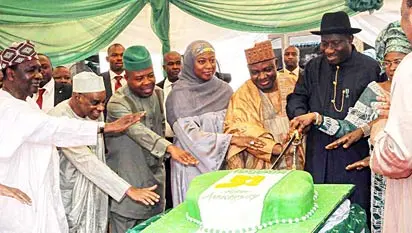I THINK one of the most defining images of recent times, was the picture of President Goodluck Jonathan on the internet, in the presence of the American Secretary of State, Hilary Clinton, at the recent 66th Session of the United Nations General Assembly, in New York.
Our president stooped with his hands behind his back, in an exaggerated expression of respect for the imperialist politician, as she pointed her index finger at Jonathan, almost like a headmistress to a student!
In that most telling of pictures, the dependent, supine state of contemporary Nigeria was played up to the world. In any case, the picture was only an expression of the major Nigerian international story: the report that Zionist Israel had pressured Nigeria to vote against recognition of the Palestinian application for membership of the United Nations and the recognition of the State of Palestine within 1967 borders, with East Jerusalem, as its capital.
Systematic injustice and wrong
The Israeli press in the lead to the General Assembly had effusively reported that the Israeli Defence Minister, Ehud Barak, had pressured Goodluck Jonathan to tow the Zionist line, and abandon Nigeria’s proud record of opposition to colonialism, apartheid and injustice. But with Jonathan, every record seemed ready to topple as our country is taken through one of its worst phases as an independent nation.
If anybody doubted the seriousness of the situation which faces us, please re-interpret the pre-independence speeches given by the president and the fact that they entire political elite and its security apparatus had to “run fi cover’ to celebrate Independence Day.
These are the worst of days in Nigeria’s history. But we have not arrived at this critical juncture because of faults in our stars or whatever those who indulge in metaphysical flight of fancy might adduce as reasons. In my view, there has been a systematic accumulation of injustice and wrong-headed political and economic choices, from independence, but especially, over the last three decades of our national life.
Ruling class and social responsibility
The Nigerian ruling class’ decision to build an unjust, non-inclusive form of neo-colonial capitalism, ensconced in incredible corruption, alienated the majority of the Nigerian people from the state. This is not surprising, since even nature itself is said to abhor a vacuum.
The withdrawal of the state from social responsibility opened up accesses for non-state actors to become decisive forces in the shaping of the consciousness of people, as rulers steal resources that ought to have turned around a potentially great country into a very livable space for its peoples.
Alienation of the people has not popularised a sophisticated analysis of the situation, but it has emboldened the forces of de-legitimization of Nigeria: regionalists and secessionists as well as the most crudely ethnic chauvinist. And all around the country, there is low intensity warfare.
The state is not only increasingly delegitimized; the incompetence of its various organs has become an additional danger to its very existence.
When Jonathan appointed service chiefs, the most experienced officers were retired to make way for the bumbling set overseeing the nation’s security today. The choice made was more about regime survival/interest than the overall security needs of the state. But that has been the norm for years!
Capitalism is parasitic
In one of the supreme absurdities of our ruling class approach, they then argue for a minimalist state; divestment of state enterprises into the hands of the private sector, etc. National patrimony becomes offloaded into the hands of cronies who strip these institutions of assets thus ensuring they are unable to be economic institutions pursuing capitalist development.
Capitalism is the most revolutionary mode in human history; it radicalises societal productive forces, including the creation of a working class which, as socialists, we can mobilise to overthrow capitalism. But in Nigeria, the crony capitalism is parasitic; it is not progressive and has been at the heart of the corruption which feeds the crises tearing our country apart.
Unfortunately for Nigeria, leadership recruitment has not been blessed with visionary and patriotic individuals able to galvanize the nation, re-order the ruling class from its destructive parasitism and imbue the country with feelings of hope on the basis of a nation-building programme. I think in Goodluck Jonathan the ruling class settled for the lowest common denominator, that is why despair and gloom seem to have overtaken Nigeria, just one hundred days into his regime.
What is most amazing is that the seemingly clueless and incompetent man is scheming to manipulate a constitutional amendment, which will then allow him to be in power for another seven years, after what is certainly panning out to be four years of mind-numbing incompetence. Those who think the man does not want to enjoy the amendment, if we are stupid enough to let it pass, are living in cloud cuckoo land!
Despite what might appear a gloomy reading of our country, I remain an incurable optimist about Nigeria’s tremendous capacity for change and development. The harbingers of such revolutionary change that our country urgently deserves, cannot be the bandit political elite, including the clowns who style themselves “progressives”, but have remained stuck in their narrow ethnic regionalism.
The change that will fundamentally re-order our country can only come from the working people and the poor and its patriotic intellectuals.


